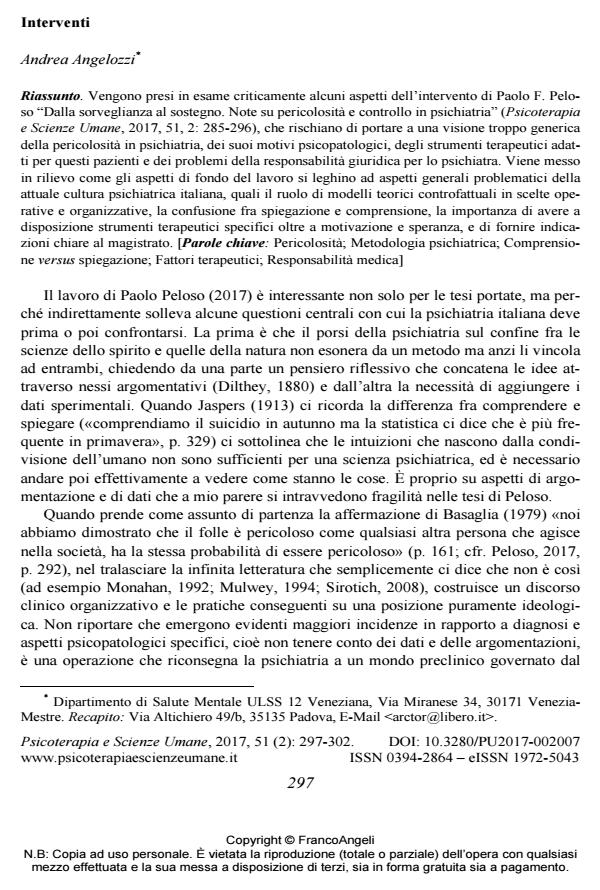Interventi
Journal title PSICOTERAPIA E SCIENZE UMANE
Author/s Andrea Angelozzi
Publishing Year 2017 Issue 2017/2
Language Italian Pages 6 P. 297-302 File size 37 KB
DOI 10.3280/PU2017-002007
DOI is like a bar code for intellectual property: to have more infomation
click here
Below, you can see the article first page
If you want to buy this article in PDF format, you can do it, following the instructions to buy download credits

FrancoAngeli is member of Publishers International Linking Association, Inc (PILA), a not-for-profit association which run the CrossRef service enabling links to and from online scholarly content.
Commentary on Paolo F. Peloso’ paper "From surveillance to support. Some notes on dangerousness and control in psychiatry" (Psicoterapia e Scienze Umane, 2017, 51, 2: 285-296). Some key aspects of Paolo F. Peloso’s paper are critically examined. These aspects may lead to a generic view of the dangerousness in psychiatry, of its psychopathological origins, of the therapeutic tools, and of the problems of legal responsibility of the psychiatrist. It is highlighted how the paper’s background relies on some general issues of current Italian psychiatric culture, such as the role of non-scientific and counterfactual theoretical models in psychiatric work and management, the confusion between explanation and comprehension, the importance of having specific tools besides staff motivation and hope, and of providing clear reference points to the judge.
Keywords: Dangerousness in psychiatry; Psychiatric epis-temology; Comprehension versus explanation; Therapeutic tools; Medical responsibility
- Angelozzi A. (2011). La fragilità di un sapere: predizioni e scommesse in psichiatria. Psichiatria di Comunità, 10, 2: 59-68.
- Angelozzi A. (2015). Sorvegliare e curare. Riflessioni sul percorso di chiusura degli Ospedali Psichiatrici Giudiziari. Psicoterapia e Scienze Umane, XLIX, 3: 464-475. DOI: 10.3280/PU2015-003008
- Angelozzi A. (2017). I Servizi di salute mentale all’epoca delle REMS. Psicoterapia e Scienze Umane, 51, 1: 127-132. DOI: 10.3280/PU2017-001010
- Basaglia F. (1979). Conferenze brasiliane. Milano: Raffaello Cortina, 2000.
- Biondi M., Boccara P., Corrivetti G., Digiannantonio M., Ferrari S., Nicolò G., Perini R., Pom-pili E., Vaggi M. & Veltro F. (2015). Chiusura OPG. Benissimo, ma gli psicopatici non possono stare nelle nuove REMS. Questi pazienti hanno bisogno di un percorso differenziato che non è identificabile nell’attuale strutturazione delle REMS, ma presentano peculiarità che per sicurezza e coerenza trattamentale non sono allo stato realizzabili nelle strutture re-sidenziali. Quotidiano Sanità, 18 dicembre 2015. Anche in: Psicoterapia e Scienze Umane, 2016, L, 1: 136-140. DOI: 10.3280/PU2016-001011
- Bonta J., Law M. & Hanson K. (1998). The prediction of criminal and violent recidivism among mentally disordered offenders: A meta-analysis. Psychological Bulletin, 123, 2: 123-142. DOI: 10.1037/0033-2909.123.2.123
- Comitato Esecutivo della SIP (Società Italiana di Psichiatria) (2016). Il dialogo necessario tra la Sanità che Cura e la Giustizia che Custodisce. Valutazioni e proposte della SIP. Psicoterapia e Scienze Umane, L, 1: 130-135. DOI: 10.3280/PU2016-001010
- Dilthey W. (1880). Ausarbeitung der deskriptiven Psychologie (trad. it: Idee su una psicologia descrittiva e analitica. In: Per la fondazione delle scienze dello spirito. Milano: Franco Angeli, 1985, pp. 138-217).
- Gramsci A. (1929). Lettera al fratello Carlo del 19 dicembre 1929. In: Lettere dal carcere. To-rino: Einaudi, 1948; Roma: L’Unità, 1988, vol. I, pp. 211-213.
- Jaspers K. (1913). Allgemeine Psychopathologie. Ein Leitfaden für Studierende, Ärzte und Psy-chologe. Berlin: Springer, 1959 (7a ediz.) (trad. it: Psicopatologia generale. Roma: Il Pen-siero Scientifico, 1964).
- Monahan J. (1992). Mental disorder and violent behavior: Perceptions and evidence. American Psychologist, 47, 4: 511-521. DOI: 10.1037/0003-066X.47.4.511
- Mulvey P.E. (1994). Assessing the evidence of a link between mental illness and violence. Psy-chiatric Services, 45, 7: 663-668.
- Peloso P.F. (2017). Dalla sorveglianza al sostegno. Note su pericolosità e controllo in psichiatria. Psicoterapia e Scienze Umane, 51, 2: 285-296. DOI: 10.3280/PU2017-002006
- Pozzi E. (2008). Responsabilità in psichiatria: una nota. Psicoterapia e Scienze Umane, XLII, 2: 219-224.
- Sirotich F. (2008). Correlates of crime and violence among persons with mental disorder: An evidence-based review. Brief Treatment and Crisis Intervention, 8, 2: 171-194.
- SISM (Sistema Informativo per la Salute Mentale) (2015). Rapporto salute mentale. --Internet: www.salute.gov.it/imgs/C_17_pubblicazioni_2550_allegato.pdf.
- Swanson J.W., Swartz M.S., Essock S.M., Osher F.C., Wagner H.R., Goodman L.A., Rosen-berg S.D. & Meador K.G. (2002). The social-environmental context of violent behavior in persons treated for severe mental illness. American Journal of Public Health, 92, 9: 1523-31. DOI: 10.2105/AJPH.92.9.1523
- Swanson J.W. (2008). Preventing the unpredicted: Managing violence risk. Psychiatric Services, 59, 2: 191-193.
- Szasz T. (1963). Law, Liberty and Psychiatry. An Inquiry into the Social Uses of Mental Health Practices. New York: Mcmillan Company (trad. it.: Legge, libertà e psichiatria. Milano: Giuffrè, 1984).
- "Ritorno a Basaglia": una prospettiva possibile per la salute mentale? "Back to Basaglia": A possible perspective for mental health? Paolo Francesco Peloso, in PSICOTERAPIA E SCIENZE UMANE 4/2022 pp.593
DOI: 10.3280/PU2022-004005 - Dibattiti. Alcuni chiarimenti a proposito di pericolosità e controllo in psichiatria Paolo Francesco Peloso, in PSICOTERAPIA E SCIENZE UMANE 3/2017 pp.447
DOI: 10.3280/PU2017-003008 - Dibattiti. Senza scienza e senza cultura. Riflessioni sulle riforme in salute mentale Andrea Angelozzi, in PSICOTERAPIA E SCIENZE UMANE 1/2019 pp.107
DOI: 10.3280/PU2019-001006
Andrea Angelozzi, Interventi in "PSICOTERAPIA E SCIENZE UMANE" 2/2017, pp 297-302, DOI: 10.3280/PU2017-002007